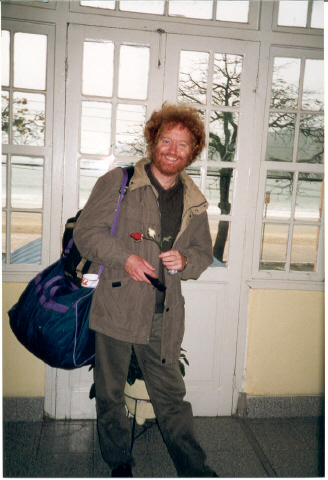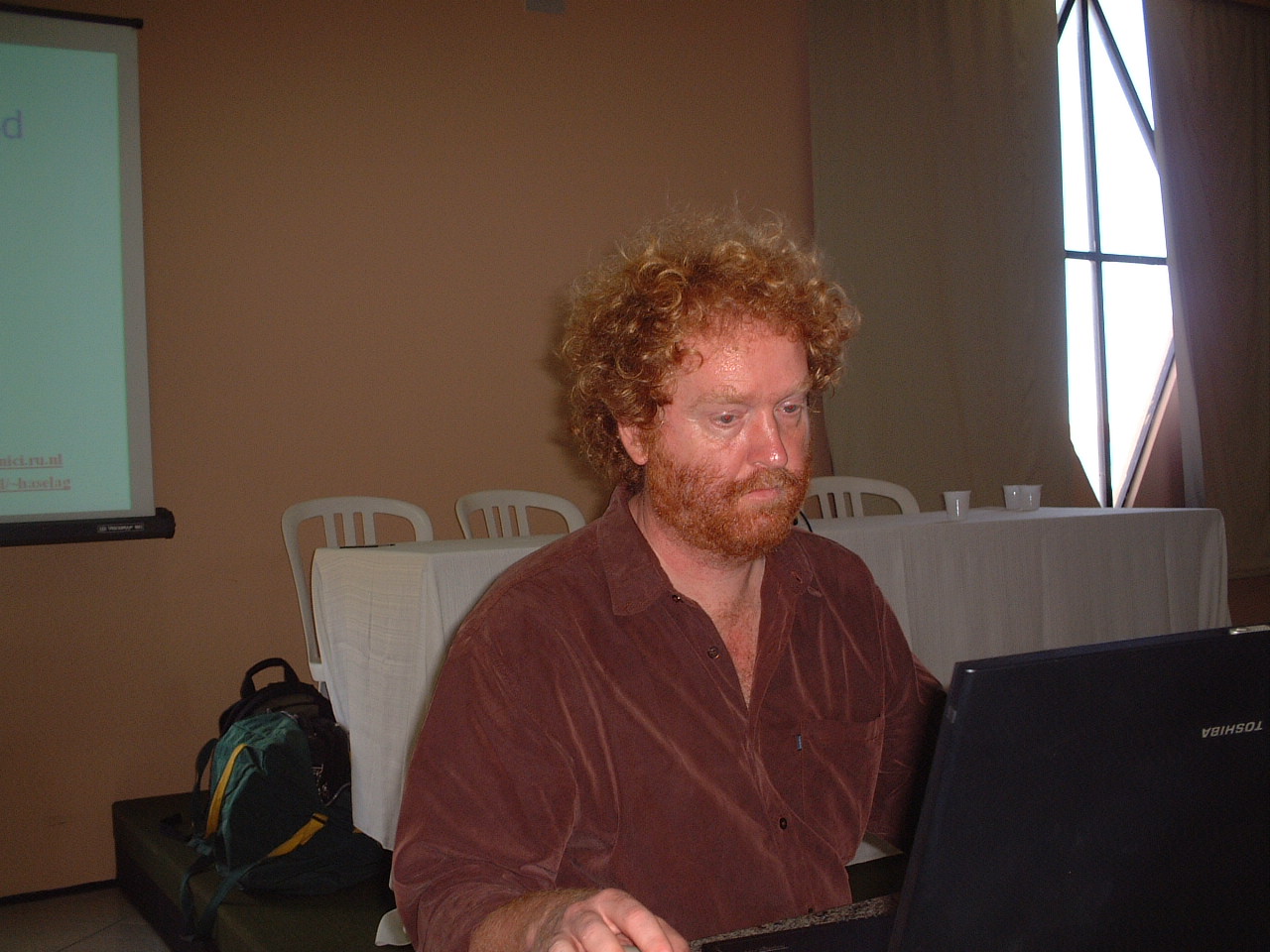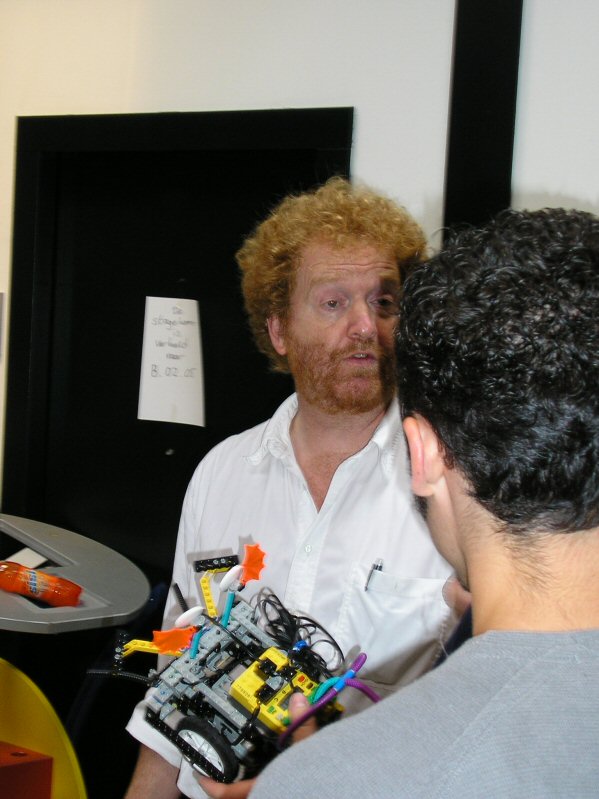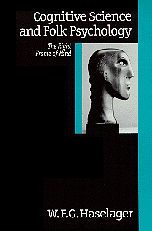|
|
Publications on Google scholar citations
2021 Mecacci, G. & Haselager, W.F.G. (in press/2021). Responsibility, authenticity and the self in the case of symbiotic technology. American Journal of Bioethics: Neuroscience.Starke, G., van den Brule, R., Elger, B., & Haselager, W.F.G. (in press/2021). Intentional machines: A defense of trust in medical AI. Bioethics Haselager, W.F.G., Mecacci, G., & Wolkenstein, A. (2021). Can BCIs enlighten the concept of agency? A plea for an experimental philosophy of neurotechnology. In O. Friedrich, A. Wolkenstein, C. Bublitz, R. J. Jox, & E. Racine (Eds.), Clinical Neuroethics meets Artificial Intelligence: Philosophical, ethical, legal and social implications, 55-68. Cham: Springer. https://doi.org/10.1007/978-3-030-64590-8_5 Haselager, W.F.G. (in press/2021). Implications of neurotechnology: Brain recording and intervention. In: J. Hage, Bartosz Brozek, & N. Vincent (Eds). Neurolaw. Cambridge: Cambridge University Press. Marenko, B. & Haselager, W.F.G. (in press/2021). Marx in the smart living room: What would a Marx-oriented approach to smart objects be like? In M. Rozendaal, B. Marenko & W. Odom (Eds.). Designing Smart Objects in Everyday Life: Intelligences, Agencies, Ecologies. Bloomsbury, UK: Bloomsbury Publishing. Haselager, W.F.G. (in press/2021). Towards wise objects: The value of knowing when to quit. In: M. Rozendaal, B. Marenko & W. Odom (Eds.). Designing Smart Objects in Everyday Life: Intelligences, Agencies, Ecologies. Bloomsbury, UK: Bloomsbury Publishing. Haselager, W.F.G. & Mecacci, G. (in press/2021). The importance of expiry dates: Evaluating the societal impact of AI based neuroimaging. In: M. Ienca & F. Jotterand (Eds.). Artificial Intelligence in Brain and Mental Health: Ethics & Policy Issues. Springer 2020 Haselager, W.F.G. & Mecacci, G. (2020). Superethics instead of superintelligence: Know thyself, and apply science accordingly. AJOB Neuroscience, 11 (2), 113-119. https://doi.org/10.1080/21507740.2020.1740353 Krol, L.R., Haselager, W.F.G. & Zander, T.O. (2020). Cognitive and affective probing: A tutorial and review of active learning for neuroadaptive technology. Journal of Neural Engineering, 17 (1):012001. https://doi.org/10.1088/1741-2552/ab5bb5 Santa Barbera, M., & Haselager, W. F. G. (2020). The habit of massively multiplayer online role-playing games (MMORPGs ): A phenomenological analysis of bodily self-perception in gaming addiction. Rivista Internazionale Di Filosofia e Psicologia, 11, 190–210. https://doi.org/10.4453/rifp.2020.0012 Haselager, W.F.G. (2020). Conceptual revisions: Intentions and free will in the light of cognitive neuroscience. In R. Peels, J. de Ridder & R. van Woudenberg (Eds.), Scientific challenges to common sense philosophy (pp. 104-120; With a reply by Timothy O’Connor). New York, NY: Routledge https://doi.org/10.4324/9781351064224 Rozendaal, M.C., Beek, E. van, Haselager, W.F.G., Abbink, D.A. & Jonker, C.M. (2020). Shift and blend: Understanding the hybrid character of computing artefacts on a tool-agent spectrum. In Proceedings of the 8th International Conference on Human-Agent Interaction (pp. 171-178). New York, NY: Association for Computing Machinery. https://doi.org/10.1145/3406499.3415066 [2nd prize best conference paper] Ras, G.E.H., Ambrogioni, L., Haselager, W.F.G., Gerven, M.A.J. van & Gülu, U. (2020). Explainable 3D convolutional neural networks by learning temporal transformations. https://arxiv.org/abs/2006.15983 arXiv, available from June 29, 2020). 2019 Peeters, A. & Haselager, W.F.G. (2019). Designing virtuous sex robots. International Journal of Social Robotics. https://link.springer.com/article/10.1007/s12369-019-00592-1 Verbaarschot, C., Farquhar, J. & Haselager, W.F.G. (2019). Free Wally: Where motor intentions meet reason and consequence. Neuropsychologia, 133. https://doi.org/10.1016/j.neuropsychologia.2019.107156 Ienca, M., Haselager, P., & Emanuel, E. J. (2019). Reply to “Separating neuroethics from neurohype.” Nature Biotechnology, 37(September), 991–992. https://doi.org/10.1038/s41587-019-0226-8 Verbaarschot, C., Haselager, W.F.G. & Farquhar, J. (2019). Probing for Intentions: Why Clocks Do Not Provide the Only Measurement of Time. Frontiers in human neuroscience, 13. 12 March 2019. https://doi.org/10.3389/fnhum.2019.00068 Mecacci, G., & Haselager, W.F.G. (2019). Five Criteria for Assessing the Implications of NTA Technology. American Journal of Bioethics: Neuroscience, 7740(May), 20–23. https://www.tandfonline.com/doi/full/10.1080/21507740.2019.1595781 Mecacci, G. & Haselager, W.F.G. (2019). Identifying criteria for the evaluation of the implications of brain reading for mental privacy. Science and Engineering Ethics. doi: 10.1007/s11948-017-0003-3 2018 Blokpoel, M., Wareham, T.,Haselager, W.F.G., Toni, I. & van Rooij, I. (2018). Deep Analogical Inference as the Origin of Hypotheses. The Journal of Problem Solving: Vol. 11 : Iss. 1, Article 3. DOI: 10.7771/1932-6246.1197 Available at: https://docs.lib.purdue.edu/jps/vol11/iss1/3" Ienca, M., Haselager, W.F.G. & Emanuel, E. (2018). Brain leaks and consumer neurotechnology. Nature Biotechnology, 36(9), 805-810. https://doi.org/10.1038/nbt.4240 https://www.nature.com/articles/nbt.4240 0 Verbaarschot, C. & Haselager, W.F.G. (2018). Useful review marked by conceptual vagueness. American Journal of Bioethics: Neuroscience, 9:1, 47-48. https://DOI.org/10.1080/21507740.2018.1425759 De Haas, M., Aroyo, A.M., Haselager, W.F.G., Smeekens, I. & Barakova, E. (2018). Comparing robots with different levels of autonomy in educational setting. V. Sgurev et al. (eds.), Practical Issues of Intelligent Innovations, Studies in Systems, Decision and Control 140, pp.293-311. https://doi.org/10.1007/978-3-319-78437-3_13 Ras, G., van Gerven, M., & Haselager, W.F.G. (2018). Explanation Methods in Deep Learning: Users, Values, Concerns and Challenges. Jair Escalante, H., Escalera, S., Guyon, I., Baró, X., Güçlütürk, Y., Güçlü, U., van Gerven, M.A.J. (Eds.). Explainable and Interpretable Models in Computer Vision and Machine Learning, Springer series on Challenges in Machine Learning. https://www.springer.com/us/book/9783319981307 Spagnolli A., Frank L.E., Haselager P., Kirsh D. (2018) Transparency as an Ethical Safeguard. In: Ham J., Spagnolli A., Blankertz B., Gamberini L., Jacucci G. (eds) Symbiotic Interaction. Symbiotic 2017. Lecture Notes in Computer Science, vol 10727 (pp. 1-6).. Springer, Cham. https://doi.org/10.1007/978-3-319-91593-7_1 Haselager, W.F.G. & Mecacci, G. (2018). Is Brain Reading Mind Reading? in Neurolaw and responsibility for action: Concepts, Crimes and Courts, Ed: B. Donnelly-Lazarov, Cambridge: Cambridge University Press. pp.182-191. https://doi.org/10.1017/9781108553339.009 Wolfert, P., de Haas, M. Vogt, P. & Haselager, W.F.G. (2018) Measuring Engagement Online in CRI. Interaction Design and Children (IDC2018) Workshop. https://sites.google.com/view/cri-idc-workshop/accepted-papers https://drive.google.com/file/d/16dS1WcnBrWLgpZYas6gxcMc1Ufy-sGgV/view"> 2017 Mecacci, G. & Haselager, W.F.G. (2017). Identifying Criteria for the Evaluation of the Implications of Brain Reading for Mental Privacy. Science and Engineering Ethics. https://link.springer.com/content/pdf/10.1007/s11948-017-0003-3.pdf doi:10.1007/s11948-017-0003-3 http://rdcu.be/BCMP" Van der Woerdt, S. & Haselager, W.F.G. (2017). When Robots Appear to Have a Mind: the Human Perception of Machine Agency and Responsibility. New Ideas in Psychology. doi: 10.1016/j.newideapsych.2017.11.001 http://www.sciencedirect.com/science/article/pii/S0732118X17300752 Mecacci, G. & Haselager, W.F.G. (2017) Positive Outcomes and Causal Insufficiency Do Not Rule Out the Risk (and Importance) of DBS-Related Identity Changes. American Journal of Bioethics: Neuroscience 2017; 8(2):128-129. doi:10.1080/21507740.2017.1320336. http://www.tandfonline.com/toc/uabn20/8/2?nav=tocList de Haas, M., Smeekens, I., Njeri, E., Haselager, P., Buitelaar, J., Lourens, T., Staal, W., Glennon, J. & Barakova, E. (2017). Personalizing Educational Game Play with a Robot Partner. In M. Merdan, W. Lepuschitz, G. Koppensteiner, & R. Balogh (Eds.), Robotics in Education: Research and Practices for Robotics in STEM Education (pp. 259–270). inbook, Cham: Springer International Publishing. doi.org/10.1007/978-3-319-42975-5_23 http://link.springer.com/chapter/10.1007/978-3-319-42975-5_23"> van der Woerdt, S. & Haselager, W.F.G. (2017). Lack of Effort or Lack of Ability? Robot Failures and Human Perception of Agency and Responsibility. In T. Bosse & B. Bredeweg (Eds.) Revised Selected Papers of the 28th Benelux Conference on Artificial Intelligence Amsterdam, The Netherlands, November 10, 2016. Cham: Springer Verlag. pp. 155-168. Van Houwelingen-Snippe, J., Vroon, J., Englebienne, G., & Haselager, W.F.G. (2017). Blame my Telepresence Robot, Joint Effect of Proxemics and Attribution on Interpersonal Attraction. Proceedings of the 26th IEEE International Symposium on Robot and Human Interactive Communication, (RO-MAN 2017, August 28-31, 2017). http://ieeexplore.ieee.org/document/8172296/conferences/ROMAN17/program/ROMAN17_ContentListWeb_2.html#tu1e_02 Van der Woerdt, S. & Haselager, W.F.G. (2017). Lack of effort or lack of ability? Robot failures and human perception of agency and responsibility. In: T. Bosse and B. Bredeweg (Eds.): Proceedings of BNAIC 2016, CCIS 765, pp. 155–168, 2017. Lenders, D. & Haselager, W.F.G. (2017). ‘Well, at least it tried’ The Role of Intentions and Outcomes in Ethically Evaluating Robot Actions. Proceedings of the 29th Benelux Conference of Artificial Intelligence. Groningen, November 8-9-2017. http://bnaic2017.ai.rug.nl/preproceedings.pdf#paper-12.chapter Springer Verlag. 2016 Van den Brule, R., Bijlstra, G., Dotsch, R., Haselager, W.F.G. & Wigboldus, D. (2016). Warning signals for poor performance improve human-robot interaction. International Journal of Human-Robot Interaction 5(2), 69-89. http://humanrobotinteraction.org/journal/index.php/HRI/article/view/271 Janssen, R., Nolfi, S., Haselager, W.F.G., & Sprinkhuizen-Kuiper, I. (2016). Cyclic Incrementality in Competitive Coevolution: Adaptability Through Pseudo-Baldwinian `Switching Genes'. Artificial Life 22(3), 319-352. http://www.mitpressjournals.org/doi/abs/10.1162/ARTL_a_00208#.V-uhd9wadBw. Leone, F., Van Toor, D., & Haselager, W.F.G. (2016). Neurowetenschap en recht (Neuroscience and law. Text in Dutch). In: M. Boons, C. Brants & R. Kool (Eds.). Criminologie en Strafrecht, Tweede druk. Amsterdam: Boom (pp.163-185). Ienca, M., & Haselager, P. (2016). Hacking the brain: brain--computer interfacing technology and the ethics of neurosecurity. Ethics and Information Technology, 18(2), 117-129. doi:10.1007/s10676-016-9398-9 http://link.springer.com/article/10.1007/s10676-016-9398-9 Verbaarschot, C., Haselager, W.F.G., & Farquhar, J. (2016). Detecting traces of consciousness in the process of intending to act. Experimental Brain Research, 234(7), 1945-1956. doi:10.1007/s00221-016-4600-1. http://link.springer.com/article/10.1007/s00221-016-4600-1?wt_mc=internal.event.1.SEM.ArticleAuthorOnlineFirst Mecacci, G. & Haselager, W.F.G. (2016). Dualism and Materialism in the Era of Neurotechnology: The Case of DBS. In A. Lavazza (Ed.) Frontiers in Neuroethics: Conceptual and Empirical Advancements (pp.53-65). Cambridge Scholars Publishing. Ienca, M. & Haselager, W.F.G. (2016). Brain-Computer Interfacing, social responsibility and the ethics of neurosecurity. In: Veljko Dubljević (author): 21 Selected Abstracts from the Montreal Neuroethics Conference for Young Researchers. Neuroethics, 9:137–145, DOI 10.1007/s12152-016-9262-y 2015 Mecacci, G., & Haselager, P. (2015). A Reason To Be Free. Neuroethics. doi:10.1007/s12152-015-9241-8 http://link.springer.com/article/10.1007/s12152-015-9241-8?wt_mc=internal.event.1.SEM.ArticleAuthorOnlineFirst Haselager, W. F. G. (2015). Wat hebben de psychologie en de robotica elkaar te bieden? De Psycholoog, 64, 22-26. Sommers, R. P., Dings, R., Neijenhuijs, K. I., Andringa, H., Arts, S., van de Bult, D., Klockenbusch, L., Wanningen, E., de Bruin, L.C. & Haselager, W. F. G. (2015). A Young Scientist's Perspective on DBS: A Plea for an International DBS Organization. Neuroethics, 15-18. doi:10.1007/s12152-015-9231-x Verbaarschot, C., Farquhar, J., & Haselager, W.F.G. (2015). Lost in time ... The search for conscious intentions and Readiness Potentials. Consciousness and Cognition, 33, 300-315. doi:10.1016/j.concog.2015.01.011 Farjam, M., Failo, M., Haselager, W.F.G., & Sprinkhuizen-Kuiper, I. (2015). Punishment mechanisms and their effect on cooperation: A simulation study. Journal of Artificial Societies and Social Simulation. 2014 Mecacci, G. & Haselager, W.F.G. (2014). Stimulating the self: The influence of conceptual frameworks on reactions to deep brain stimulation. American Journal of Bioethics: Neuroscience, 5(4), 30-39. doi:10.1080/21507740.2014.951776. Haselager, W.F.G. (2014). Vrije wil dankzij de hersenen. In: J. Baijens (Ed.). Het beste idee 2014. Amsterdam: Uitgeverij de wereld Vlek, R., van Acken, J., Beurskens, E., Roijendijk, L., & Haselager, W.F.G. (2014). BCI and a user's judgment of agency. Mueller, G. & Hildt, E. (eds.). Brain-Computer Interfaces in their ethical, social and cultural contexts. Dordrecht: Springer. Brule, R., Dotsch, R., Bijlstra, G., Wigboldus, D. H. J., & Haselager, P. (2014). Do Robot Performance and Behavioral Style affect Human Trust? International Journal of Social Robotics. https://doi.org/10.1007/s12369-014-0231-5 Uithol, S., Burnston, D. C., & Haselager, P. (2014). Why we may not find intentions in the brain. Neuropsychologia, 56, 129-139. doi:10.1016/j.neuropsychologia.2014.01.010 Olthof, B., Peeters, A., Schelle, K., & Haselager, W.F.G. (2014) If you're smart, we'll make you smarter: Applying the reasoning behind the development of honours programmes to other forms of cognitive enhancement. In: F. Lucivero & A. Vedder (Eds.). Beyond therapy versus enhancement? Multidisciplinary analyses of a heated debate. Pisa: Pisa University Press (pp. 117-142). more information Vilaza, G., Campos, A., Haselager, W., & Vuurpijl, L. (2014). Using games to investigate sense of agency and attribution of responsibility. In Proceedings of SBGames 2014 (pp. 393-399). http://www.sbgames.org/sbgames2014/files/papers/culture/full/Cult_Full_Using games to investigate.pdf 2013 Haselager, W.F.G. (2013). Robot-bewijs (A robot driving license. Text in Dutch). In: J. Baijens (Ed.). Het beste idee 2013. Amsterdam: Uitgeverij de wereld (pp. 198-199). Leone, F., Van Toor, D., & Haselager, W.F.G. (2013). Neurowetenschap en recht (Neuroscience and law. Text in Dutch). In: M. Boons & C. Brants (Eds.). Criminologie en Strafrecht. Amsterdam: Boom (pp.151-171). Haselager, W.F.G. (2013). De vrije wil wordt mede mogelijk gemaakt door de hersenen (Free will is made possible in part by the brain. Text in Dutch). In: P. Oomen (ed.). Vrije wil: Een hersenkronkel? Zoetermeer: Klement. Haselager, W.F.G., Leone, F, F., & van Toor, D. (2013). Data en interpretaties in de cognitieve neurowetenschap (Data and interpretations in cognitive neuroscience. Text in Dutch). Justitiele Verkenningen, 39(1), 78-89. Haselager, W.F.G. (2013). Did I do that? Brain-Computer Interfacing and the sense of agency. Minds and Machines 23(3) , 405-418. DOI 10.1007/s11023-012-9298-7 Klaming, L., & Haselager, W.F.G. (2013). Did my brain implant make me do it? Questions raised by DBS regarding psychological continuity, responsibility for action and mental competence. Neuroethics, 6(3), 527-539,doi: 10.1007/s12152-010-9093-1. Janssen, J.H., Tacken, P., de Vries, G-J., van den Broek, E.L., Westerink, J.H.D.M., Haselager, W.F.G., & IJsselsteijn, W.A. (2013). Machines outperform lay persons in recognizing emotions elicited by autobiographical recollection. International Journal of Human-Computer Interaction, 28(6), 479-517. doi: 10.1080/07370024.2012.755421. Ligthart, M., van den Brule, R., & Haselager, W.F.G. (2013). Human-robot trust: Is motion fluency an effective behavioral style for regulating robot trustworthiness? Proceedings of the 25th Benelux Conference on Artificial Intelligence (BNAIC 2013). (pp.112-119). more info Van den Brule, R., Bijlstra, G., Dotsch, R., Wigboldus, D., & Haselager, W.F.G. (2013) Signaling Robot Trustworthiness: Effects of Behavioral Cues as Warnings G. Herrmann et al. (Eds.): International Conference on Social Robotics 2013, LNAI 8239, pp. 583-584, 2013. Springer International Publishing Switzerland 2013. more info Tukker, R., van Rossum, A.C., Frank, S.L., & Haselager, W.F.G. (2013). Hierarchical structure in prefrontal cortex improves performance at abstract tasks. In: J. Mayor & P. Gomez (Eds).Computational models of cognitive processes: Proceedings of the NCPW 13 - 13th Neural Computation and Psychology Workshop 2012, San Sebastian, Spain, July 12-14, 2012. (pp. 170-184). more info 2012 Bulten, W., Haselager, W.F.G., & Sprinkhuizen-Kuyper, I.G. (2012). Sharing blood: A decentralised trust and sharing ecosystem based on the vampire bat. Proceedings of the 24th Benelux Conference on Artificial Intelligence (BNAIC 2012). In: Jos W.H.M. Uiterwijk, Nico Roos, and Mark H.M. Winands (eds.), The 24th Benelux Conference on Artificial Intelligence (BNAIC) 2012, Proceedings of the 24th Benelux Conference on Artificial Intelligence, 25 - 26 October 2012, Maastricht, The Netherlands, ISSN 1568-7805, pp. 35-42 Farjam, M., Haselager, W.F.G., & Sprinkhuizen-Kuyper, I.G. (2012). Greed, envy, jealousy: A tool for more efficient resource management. Proceedings of the 24th Benelux Conference on Artificial Intelligence (BNAIC 2012). In: Jos W.H.M. Uiterwijk, Nico Roos, and Mark H.M. Winands (eds.), The 24th Benelux Conference on Artificial Intelligence (BNAIC) 2012, Proceedings of the 24th Benelux Conference on Artificial Intelligence, 25 - 26 October 2012, Maastricht, The Netherlands, ISSN 1568-7805, pp. 99-107 Gerke, P.K., Langevoort, J., Lagarde, S., Bax, L., Grootswagers, T., Drenth, R-J., Slieker, V., Vuurpijl, L, Haselager, W.F.G., Sprinkhuizen-Kuypers I, & de Croon, G. (2011), BioMAV: bio-inspired intelligence for autonomous flight, In: Proceedings of the International Micro Air Vehicle conference and flight competitions 2011 (IMAV 2011) summer edition. Haselager, W.F.G. (2012). Like the breathability of air: Embodied Embedded Communication. Pragmatics & Cognition, 20(2), 263-274. Doi: 10.1075/pc.20.2.04has Blokpoel, M., van Kesteren, M., Stolk, A., Haselager, W.F.G., Toni, I., & van Rooij, I. (2012). Recipient design in human communication: Simple heuristics or perspective taking? Frontiers in Human Neuroscience, 6. doi: 10.3389/fnhum.2012.00253 Uithol, S., van Rooij, I., Bekkering, H., & Haselager, W.F.G. (2012). Hierarchies in Action and Motor Control. Journal of Cognitive Neuroscience. doi:10.1162/jocn_a_00204 Haselager, W.F.G., Broens, M. & Gonzalez, M.E.Q. (2012). The importance of sensing ones movements in the world for the sense of personal identity. Rivista Internazionale di Filosofia e Psicologia, 3(1), 1-11. doi: 10.4453/rifp.2012.0001. Tukker, R., van Rossum, A.C., Frank, S.L., & Haselager, W.F.G. (2012). Hierarchical structure in prefrontal cortex improves performance at abstract tasks. NCPW 13 - 13th Neural Computation and Psychology Workshop 2012 was held in San Sebastian, Spain on July 12-14, 2012. Bulten, W., Haselager, W.F.G., & Sprinkhuizen-Kuyper, I.G. (2012). Sharing blood: A decentralised trust and sharing ecosystem based on the vampire bat. Proceedings of the 24th Benelux Conference on Artificial Intelligence (BNAIC 2012). In: Jos W.H.M. Uiterwijk, Nico Roos, and Mark H.M. Winands (eds.), The 24th Benelux Conference on Artificial Intelligence (BNAIC) 2012, Proceedings of the 24th Benelux Conference on Artificial Intelligence, 25 - 26 October 2012, Maastricht, The Netherlands, ISSN 1568-7805, pp. 35-42 Farjam, M., Haselager, W.F.G., & Sprinkhuizen-Kuyper, I.G. (2012). Greed, envy, jealousy: A tool for more efficient resource management. Proceedings of the 24th Benelux Conference on Artificial Intelligence (BNAIC 2012). In: Jos W.H.M. Uiterwijk, Nico Roos, and Mark H.M. Winands (eds.), The 24th Benelux Conference on Artificial Intelligence (BNAIC) 2012, Proceedings of the 24th Benelux Conference on Artificial Intelligence, 25 - 26 October 2012, Maastricht, The Netherlands, ISSN 1568-7805, pp. 99-107 Vlek, R., Steines, D., Szibbo, D., Ku¼bler, A., Schneider, M-J., Haselager, W.F.G., & Nijboer, F. (2012). Ethical issues in BCI research, development, and dissemination - four case scenarios. Neurorehabilitation & Neural Repair. doi: 10.1097/NPT.0b013e31825064cc Nijboer, F., Clausen, J., Allison, B.Z., & Haselager, W.F.G. (2011). The Asilomar Survey: Stakeholders. opinions on ethical issues related to Brain-Computer Interfacing. Neuroethics. DOI: 10.1007/s12152-011-9132-6 2011 Uithol, S., van Rooij, I., Bekkering, H. & Haselager, W.F.G. (2011). What do mirror neurons mirror? Philosophical Psychology. DOI: 10.1080/09515089.2011.562604 Nijboer, F., Clausen, J., Allison, B.Z., & Haselager, W.F.G. (2011). Researchers.opinions about ethically sound dissemination of BCI research to the public media. International Journal of Bioelectromagnetism, 13. Uithol, S., van Rooij, I., Bekkering, H., & Haselager, W.F.G. (2011). Understanding motor resonance. Social Neuroscience, 6 (4), 388-397. DOI: 10.1080/17470919.2011.559129 Blokpoel, M., Kwisthout, J., Wareham, T., Haselager, W.F.G., Toni, I., & van Rooij, I. (2011). The computational costs of recipient design and intention recognition in communication. Proceedings of the 33rd annual meeting of the Cognitive Science Society. Boston, Massachusetts, USA. (20-23/7-2011). Gerke, P.K., Langevoort, J., Lagarde, S., Bax, L., Grootswagers, T., Drenth, R-J., Slieker, V., Vuurpijl, L, Haselager, W.F.G., Sprinkhuizen-Kuypers I, & de Croon, G. (2011). BioMAV: Bio-inspired intelligence for autonomous flight. Proceeedings of the International Micro Air Vehicles Conference and Flight Competition. (12/15-9-2011). .t Harde, the Netherlands Datadien, A, Haselager, W.F.G., &, Sprinkhuizen-Kuyper, I. (2011). The right delay: detecting specific spike patterns with STDP and axonal conduction delays. In A. Dobnikar, U. Lotric & B. Ster (Eds.). In Springer Lecture Notes in Computer Science . LNCS. International Conference on Adaptive and Natural Computing Algorithms, ICANNGA'11. Ljubljana, Slovenia (14/16-4-2011). Hindriks, K., Wiggers, P., Jonker, C. & Haselager, W.F.G. (2011). Towards a computational model of the self-attribution of agency. Modeling and support of cognitive and affective human processing. The Twenty Fourth International Conference on Industrial, Engineering & Other Applications of Applied Intelligent Systems (IEA/AIE 2011), Syracuse, NY, USA, 28-6/1-7-2011). Wareham, T., Kwisthout, J., Haselager, W.F.G., & van Rooij, I. (2011). Ignorance is bliss: A complexity perspective on adapting reactive architectures. Proceedings of the IEEE Conference on development and learning, and epigenetic robots (IEEE ICDL-EPIROB). Frankfurt am Main, Germany (24/27-8- 2011). 2010 Lagarde, S., Sprinkhuizen-Kuyper, I., de Croon, G., & Haselager, W.F.G. (2010). An intermediate form of behavioural control in 'reactive' robots. 22nd Benelux Conference on Artificial Intelligence (BNAIC, Luxembourg, 25/26-10-2010). Klaming, L., & Haselager, W.F.G. (2010). Did my brain implant make me do it? Questions raised by DBS regarding psychological continuity, responsibility for action and mental competence. Neuroethics. DOI: 10.1007/s12152-010-9093-1 Vincent, N., Haselager, W.F.G., & Lokhorst, G. (2010). "The neuroscience of responsibility" - Workshop report. Neuroethics, 4: 175-178. DOI: 10.1007/s12152-010-9078-0 Oliveira, L.F., Haselager, W.F.G., Manzolli, J., & Gonzalez, M.E.Q. (2010). Musical listening and abductive reasoning: Contributions of C.S. Peirce's philosophy to the understanding of musical meaning. Journal of Interdisciplinary Music Studies, 4(1), pp.45-70. Haselager, W.F.G. (2010). Experimentele Filosofie, kunstmatige intelligentie en cognitieve neurowetenschap (Experimental Philosophy, Artificial Intelligence and Cognitive Neuroscience, text in Dutch). Algemeen Nederlands Tijdschrift voor de Wijsbegeerte, 102 (1), 50-59. 2009 van Gerven, M., Farquhar, J., Schaefer, R., Vlek, R., Haselager, W.F.G., Vuurpijl, L., Gielen, S., & Desain, P. (2009). The Brain-Computer Interface Cycle. Journal of Neural Engineering, 6, 4, 1-10. DOI: 10.1088/1741-2560/6/4/041001 Haselager, W.F.G., Vlek, R., Hill, J., & Nijboer, F. (2009). A note on ethical aspects of BCI. Neural Networks, 22, 1352-1357. DOI:10.1016/j.neunet.2009.06.046 Frank, S., van Rooij, I. & Haselager, W.F.G. (2009). Connectionist semantic systematicity. Cognition, 110, 358-379. DOI:10.1016/j.cognition.2008.11.013 2008 Kwisthout, J., Vogt, P., Haselager, W.F.G., & Dijkstra, T. (2008). Joint attention and language evolution. Connection Science, 20(2-3), 155 - 171. DOI:10.1080/09540090802091958 Van Dijk, J., Kerkhofs, R., van Rooij, I. & Haselager, W.F.G. (2008). Can there be such a thing as embodied embedded cognitive neuroscience? Theory & Psychology, 13(3), 297-316. Spaak, E. & Haselager, W.F.G. (2008). Imitation and mirror neurons: An evolutionary robotics model. In A. Nijholt, M. Pantic, M. Poel, & H. Hondorp (Eds.) Proceedings of BNAIC 2008, the Twentieth Belgian-Dutch Artificial Intelligence Conference. (pp. 249-256). Enschede: University of Twente.
van Rooij, I., Haselager, W.F.G., & Bekkering, H. (2008). Goals are not implied by actions, but inferred from actions and contexts. Peer review of Hurley. Behavioral and Brain Sciences, 31(1), 38-39. Haselager, W.F.G. (2008). Wat je maakt ben je zelf (You are what you make). In L. Consoli & R. Hoekstra (Eds.) Technologie en mensbeeld (Technology and the human self-image, in Dutch). (pp. 38-51). Nijmegen: Valkhof Pers. Haselager, W.F.G. & Gonzalez, M.E.Q. (2008). Auto-organizacao e autonomia (Self-organization and autonomy). In I.M.L. D'Ottaviano & M.E.Q. Gonzalez (Eds.) Auto-organizacao: Estudos interdisciplinares. Colecao CLE (52). Oliveira, L.F., Haselager, W.F.G., Manzolli, J. & Gonzalez, M.E.Q. (2008). Musical meaning and logical inference from the perspective of Peircean pragmatism. In C. Tsougras & R. Parncutt (Eds.) Proceedings of the Fourth Conference on Interdisciplinary Musicology (CIM08). Thessaloniki, Greece, (7/6-7-2008). Uithol, S., Haselager, W.F.G. & Bekkering, H. (2008). When do we stop calling them mirror neurons? Proceedings of the 30th annual meeting of the Cognitive Science Society. Washington, USA. Desain, P., Farquhar, J., Haselager, W.F.G., Hesse, C., & Schaefer, R. (2008). What BCI research needs. CHI Workshop on Brain Computer Interfaces for HCI and games. Florence, Italy, April 5, 2008. http://hmi.ewi.utwente.nl/chi2008/contributions
2007 Haselager, W.F.G. & Gonzalez, M.E.Q. (2007). Mechanicism and autonomy. Introduction to the special issue. Pragmatics & Cognition, 15(3), 407-412. Gonzalez, M.E.Q., Haselager, W.F.G. & Dror, I. (2007). Pragmatics & Cognition, 15(3). Special issue on Mechanicism and Autonomy, with contributions of a.o. A. Clark and S. Gallagher. Haselager, W.F.G. (2007). Abduction's dark ways. In O. Pombo & A. Gerner (Eds.) Abduction and the process of scientific discovery. (pp. 321-333). Lissabon: Publidisa. Haselager, W.F.G. (2007). Forma, funç e a materia da experiêia (Form, function and the matter of experience). In Queiroz, J., Loula, A. & Gudwin, R. (Eds.) Computaç, cogniç e semiose. (Computation, cognition and semiosis) (pp.249-263). Salvador: EDUFBA. Haselager, W.F.G. (2007). Robotics, philosophy and the problems of autonomy. In: Dror, I. (Ed.). Cognitive Technologies and the Pragmatics of Cognition. London: John Benjamins. 61-77. Goosen, T., van den Brule, R., Janssen, J., & Haselager, W.F.G. (2007). Interleaving simulated and physical environments improves evolution of robot control structures. In M.M. Dastani & E. de Jong (Eds.) Proceedings of the 19th Belgium-Netherlands Conference on Artificial Intelligence (BNAIC) (pp.135-142). Utrecht: Utrecht University Press. Janssen, J., Goosen, T., Spinkhuizen-Kuyper, I., & Haselager, W.F.G. (2007). Embodied modeling of the organization of the brain. In M.M. Dastani & E. de Jong (Eds.) Proceedings of the 19th Belgium-Netherlands Conference on Artificial Intelligence (BNAIC) (pp.165-172). Utrecht: Utrecht University Press.
Janssen, J. Goosen, T. Spinkhuizen-Kuyper, I. & Haselager, W.F.G. (2007). Studying cerebral organization through embodied artificial evolution. In T. Goosen & J. Janssen (Eds.). Proceedings of the 1st NSVKI Student Conference. Utrecht University Press (pp.21-28). Haselager, W.F.G. (2007). Cognitive science and free will: Are we getting lost in a labyrinth? Caderno de resumos de V encontro internacional de Informaç, Conhecimento e Aç (EIICA), p.11. Marilia, SP, Brazil (17-10/21-10-2007). Hindriks, K.V., Wiggers, P., Jonker, C.M. & Haselager, W.F.G. (2007), Towards a computational model of the self-attribution of agency, in: P. Olivier and C. Kray (eds.) Proceedings of the Artificial Intelligence and Simulation of Behaviour Annual Convention 2007 (pp. 350-356). 2006 Reus, L., Haselager, W.F.G., & Nijhuis-van der Sanden, M.W.G. (2006). De reikwijdte van een kleuter: Denken over doen (Reaching capacities of an infant: Thinking about doing, Text in Dutch). Proceedings of the Royal Dutch Society for Physiotherapy (Koninklijk Nederlands Genootschap Fysiotherapie, KNGF). Conference 10/11-11-2006. Kerkhofs, R. & Haselager, W.F.G. (2006). The embodiment of meaning. Manuscrito, 29(2), 753-764. pdf-file Frank, S.L., & Haselager, W.F.G. (2006). Robust semantic systematicity and distributed representations in a connectionist model of sentence comprehension. In: R. Sun & N. Miyake (Eds.), Proceedings of the 28th annual conference of the Cognitive Science Society (pp. 226-231), Mahwah, NJ: Erlbaum. pdf-file Haselager, W.F.G., & Gonzalez, M.E.Q. (2006). The meaningful body: On the differences between artificial and organic creatures. In A. Loula, R. Gudwin and J. Queiroz (Eds.) Artificial Cognition Systems. Hershey, PA: IDEA Group Inc (pp.238-250). Haselager, W.F.G. (2005). Robotics, philosophy and the problems of autonomy. Pragmatics & Cognition, 13, 3, 515-532. pdf-file 2005 Gonzalez, M.E.Q., Broens, M.C. & Haselager, W.F.G. & Filho, E.B. (2005). Self-organization and life: A systemic approach. Manuscrito, 28(2), 375-390.
Gonzalez, M.E.Q. & Haselager, W.F.G. (2005). Creativity: Surprise and abductive
reasoning. Semiotica 153, 1/4, 325-341.
pdf-file
2004 Haselager, W.F.G. (2004). O mal estar do representacionismo: sete dores de cabeçda Ciêia Cognitiva (The indisposition of representationalism: Seven headaches of cognitive science). In A. Ferreira, M.E.Q. Gonzalez & J.G. Coelho (Eds.). Encontros com as Ciêias Cognitivas, Volume 4. SãPaulo: Coleç Estudos Cognitivos (pp. 105-120). pdf-file Gonzalez, M.E.Q., Nascimento, T.C.A., & Haselager, W.F.G. (2004). Informaç e conhecimento: notas para uma taxonomia da informaç (Information and knowledge: Notes towards a taxonomy of information). In A. Ferreira, M.E.Q. Gonzalez & J.G. Coelho (Eds.). Encontros com as Ciêias Cognitivas, Volume 4. SãPaulo: Coleç Estudos Cognitivos (pp. 195-220). pdf-file Haselager, W.F.G. (2004). Auto-organizaç e comportamento comum: Opçs e problemas. (Self-organization and common sense behavior: problems and options). In G.M. Souza, I.M.L. D'Ottaviono, & M.E.Q. Gonzalez (Eds.). Auto-organizaç: Estudos interdisciplinares. Campinas, SP Coleç CLE, Vol. 38 (pp.213-235). pdf-file
Haselager, W.F.G. (2004). Co-evolutionary robotics and the problems of autonomy. In Proceedings of the 8th Brazilian Society of Artificial Neural Networks (SBRN). IEEE-journal, ISBN 85-89029-04-2. more info Haselager, W.F.G. & Gonzalez M.E.Q. (2004). Conhecimento comum e auto-organizaç (Common sense knowledge and self-organization. In E. Rabossi (Ed.). La mente y sus problemas: Temas actuales de filosofíde la psicologí Buenos Aires: Catágos Editora (pp.95-105). pdf-file Gonzalez, M.E.Q., Broens, M. & Haselager, W.F.G. (2004). Consciousness and agency: The importance of self-organized action. Networks, 3-4. more info & pdf-file 2003 Haselager, W.F.G., de Groot, A.D., & van Rappard, J.F.H. (2003). Representationalism versus anti-representationalism: a debate for the sake of appearance. Philosophical Psychology, 16(1), 5-23. (more info) pdf-file Willems, D.J.M. & Haselager, W.F.G. (2003). Cooperative behavior in simulated reactive robots. In T. Heskes, P. Lucas, L. Vuurpijl, W. Wiegerinck (Eds). Proceedings of the 15th Belgium-Netherlands Conference on Artificial Intelligence (BNAIC). (pp. 355-362). Nijmegen: University of Nijmegen. pdf-file
Gonzalez, M.E.Q. & Haselager, W.F.G. (2003). Creativity and self-organization: contributions from cognitive science and semiotics. SEED (3),3, 61-70. pdf-file Haselager, W.F.G. (2003). Form, function and the matter of experience. SEED (3),3, 100-111. pdf-file Haselager, W.F.G. & Gonzalez, M.E.Q. (2003). A identidade pessoal e a teoria da cogniç situada e incorporada. (Personal identity and the theory of embodied embedded cognition). In M.C. Broens, C.B. Milidoni, (Eds.). Sujeito e identidade pessoal: Estudos de filosofia da mente (pp. 95-111). SãPaulo: Cultura Acadêca. pdf-file 2002 Gonzalez, M.E.Q. & Haselager, W.F.G. (2002). Raciocío abdutivo, criatividade e auto-organizaç (Abductive reasoning, creativity and self-organization). Cognitio, 3, 22-31. (more info) pdf-file 
van Rooij, I., Bongers, R.M., & Haselager, W.F.G. (2002). A non-representational approach to imagined action. Cognitive Science, 26(3), 345-375. (more info) pdf-file Haselager, W.F.G. & Gonzalez, M.E.Q. (2002). Causalidade circular e causaç mental: Uma saí para a oposiç entre internalismo e externalismo? (Circular causality and mental causation: a way out of the opposition between internalism and externalism?). Manuscrito, XXV(1), 217-238. (more info) pdf-file 2000 van Rooij, I., Bongers, R.M., & Haselager, W.F.G. (2000). The dynamics of simple prediction. In L. R. Gleitman & A. K. Joshi (Eds.). Proceedings of the 22nd annual meeting of the Cognitive Science Society (pp.535-540). Mahwah, New Jersey: Lawrence Erlbaum Associates, Publishers. pdf-file 1999 Haselager, W.F.G. (1999). On the potential of non-classical constituency. Acta Analytica, 22, 23-42. (more info) pdf-file Haselager, W.F.G. (1999). Levels of learning. Developmental Science, 2 (2), 152-153. (more info) Haselager, W.F.G. (1999). Neurodynamics and the revival of associationism in cognitive science. In A. Riegler, M. Peschl, & A. Von Stein (Eds.), Understanding representation in the cognitive sciences: Does representation need reality? (pp. 115-120). New York: Kluwer Academic / Plenum Publ. (more info) pdf-file 1998
Haselager, W.F.G., & Van Rappard, J.F.H. (1998).
Connectionism, systematicity, and the frame problem.
Minds and Machines, 8 (2), 161-179.
(more info)
Haselager, W.F.G. (1998) Learning to work together: Review of 'Consciousness
in philosophy and cognitive neuroscience' by Antti Revonsuo & Matti Kamppinen
(Eds.). Hillsdale: Lawrence Erlbaum,
1997 Haselager, W.F.G. (1997). Cognitive science and folk psychology: The right frame of mind. London: Sage. (more info) 1996 Haselager, W.F.G. (1996). Review of 'The engine of reason, the seat of the soul: A philosophical journal into the brain' by Paul Churchland. Philosophical Psychology, 9(3).
|

|
 |
 Haselager, W.F.G., van Dijk, J., & van Rooij, I. (2008). A lazy brain? Embodied embedded cognition and cognitive neuroscience. In F. Calvo Garzon & A. Gomila (Eds.) Handbook of Embodied Cognitive Science. (pp. 273-290). Oxford: Elsevier.
Haselager, W.F.G., van Dijk, J., & van Rooij, I. (2008). A lazy brain? Embodied embedded cognition and cognitive neuroscience. In F. Calvo Garzon & A. Gomila (Eds.) Handbook of Embodied Cognitive Science. (pp. 273-290). Oxford: Elsevier.
 Goosen, T., Janssen, J. & Haselager, W.F.G. (2007). Evolving in advance: Interleaving simulated and physical environments in robot evolution. In T. Goosen & J. Janssen (Eds.). Proceedings of the 1st NSVKI Student Conference. Utrecht University Press (pp.13-20).
Goosen, T., Janssen, J. & Haselager, W.F.G. (2007). Evolving in advance: Interleaving simulated and physical environments in robot evolution. In T. Goosen & J. Janssen (Eds.). Proceedings of the 1st NSVKI Student Conference. Utrecht University Press (pp.13-20).


 Haselager, W.F.G., Bongers, R.M. & van Rooij, I. (2003).
Cognitive science, representations and dynamical systems theory. In W.
Tschacher and J-P. Dauwalder (Eds.)
The dynamical systems approach to cognition:
Concepts and empirical paradigms based on self-organization, embodiment, and
coordination Dynamics. Studies of Nonlinear Phenomena in Life Science -
Vol. 10.
(pp. 229-242).
Singapore: World Scientific.
Haselager, W.F.G., Bongers, R.M. & van Rooij, I. (2003).
Cognitive science, representations and dynamical systems theory. In W.
Tschacher and J-P. Dauwalder (Eds.)
The dynamical systems approach to cognition:
Concepts and empirical paradigms based on self-organization, embodiment, and
coordination Dynamics. Studies of Nonlinear Phenomena in Life Science -
Vol. 10.
(pp. 229-242).
Singapore: World Scientific.
